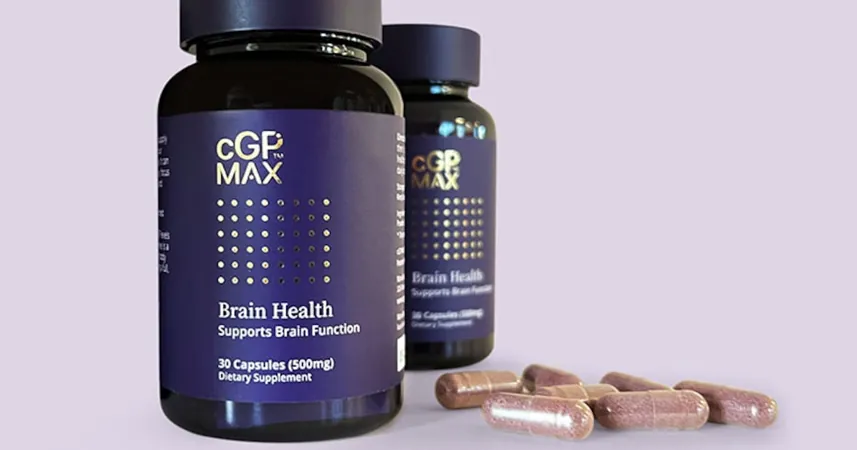
Revolutionary Discovery: Blackcurrant Compound Could Transform Diabetes Treatment
2025-09-02
Author: Mei
Unlocking the Power of Blackcurrant
A breakthrough discovery from a New Zealand company reveals that a special compound derived from blackcurrants could be a game-changer in treating diabetes complications. The molecule at the heart of this innovation is cyclic glycine-proline (cGP), which is naturally produced in the body as a metabolite of insulin-like growth factor-1 (IGF-1).
The Diabetes Dilemma: More Than Just High Blood Sugar
Diabetes isn't just about elevated blood sugar levels; it can wreak havoc on blood vessels and capillaries. Blockages can lead to serious complications like peripheral neuropathy, leaving individuals with weakened limbs and nerve pain. If the body can't produce enough cGP, supplementation might be necessary, especially for those suffering from kidney dysfunction or other diabetic-related conditions.
Promising Results from Groundbreaking Trials
An open-label trial conducted in Wuhan, China, showcased the benefits of cGP supplementation. Results indicated notable improvements in patients with diabetic-related vascular diseases; not only did it help restore foot sensation, but it also normalized crucial biomarkers like blood pressure and glycated hemoglobin (HbA1c). This demonstrates a significant step forward in diabetes research.
Dr. Guan's Insights: Rebuilding Vascular Health
Dr. Jian Guan, the chief scientific officer at The cGP Lab, elucidates how cGP can help restore capillary health. Unlike traditional diabetes medications that primarily focus on lowering blood sugar levels, cGP addresses the underlying vascular damage caused by diabetes. "Diabetes is essentially a disease of small blood vessels, and cGP aids in protecting these vessels and facilitating their repair," she emphasized.
A Unique Mechanism of Action
What's truly remarkable about cGP is its ability to interact with IGF-1 levels. Many conventional diabetes treatments do not target the root causes of complications, leaving patients vulnerable to issues like kidney dysfunction and peripheral neuropathy. cGP stands out for its capacity to promote the normal functioning of IGF-1, ultimately aiding in the regeneration of damaged vascular networks.
Trial Outcomes: A Glimpse of Hope
In the open-label trial, 38 participants with Type II diabetes took either a low or high dose of cGP over six months. Results showed that the high-concentration group experienced significant benefits after just three months, while the lower concentration group achieved comparable results in six months. The findings offer a hopeful insight into how cGP might counteract diabetic complications.
Next Steps: Clinical Trials on the Horizon
The research team is now gearing up for a placebo-controlled clinical trial in China to investigate whether cGP can also assist individuals battling both diabetes and fatty liver disease—a prospect stemming from previous studies that hinted at cGP’s potential for reducing organ fat.
The Journey to Discovery
The push to study cGP’s effects on diabetes emerged from multiple observations, including findings during pregnancy-related studies. Dr. Guan's journey into cGP was sparked by a colleague who found relief from diabetic peripheral neuropathy after taking the supplement, encouraging her to further explore its benefits.
Conclusion: A Beacon of Hope for Diabetics
With its potential to tackle the root causes of diabetes complications, cyclic glycine-proline is poised to pave the way for more effective diabetes treatments. As research continues, patients and medical professionals alike await the confirmation of its efficacy in larger, controlled studies.



 Brasil (PT)
Brasil (PT)
 Canada (EN)
Canada (EN)
 Chile (ES)
Chile (ES)
 Česko (CS)
Česko (CS)
 대한민국 (KO)
대한민국 (KO)
 España (ES)
España (ES)
 France (FR)
France (FR)
 Hong Kong (EN)
Hong Kong (EN)
 Italia (IT)
Italia (IT)
 日本 (JA)
日本 (JA)
 Magyarország (HU)
Magyarország (HU)
 Norge (NO)
Norge (NO)
 Polska (PL)
Polska (PL)
 Schweiz (DE)
Schweiz (DE)
 Singapore (EN)
Singapore (EN)
 Sverige (SV)
Sverige (SV)
 Suomi (FI)
Suomi (FI)
 Türkiye (TR)
Türkiye (TR)
 الإمارات العربية المتحدة (AR)
الإمارات العربية المتحدة (AR)